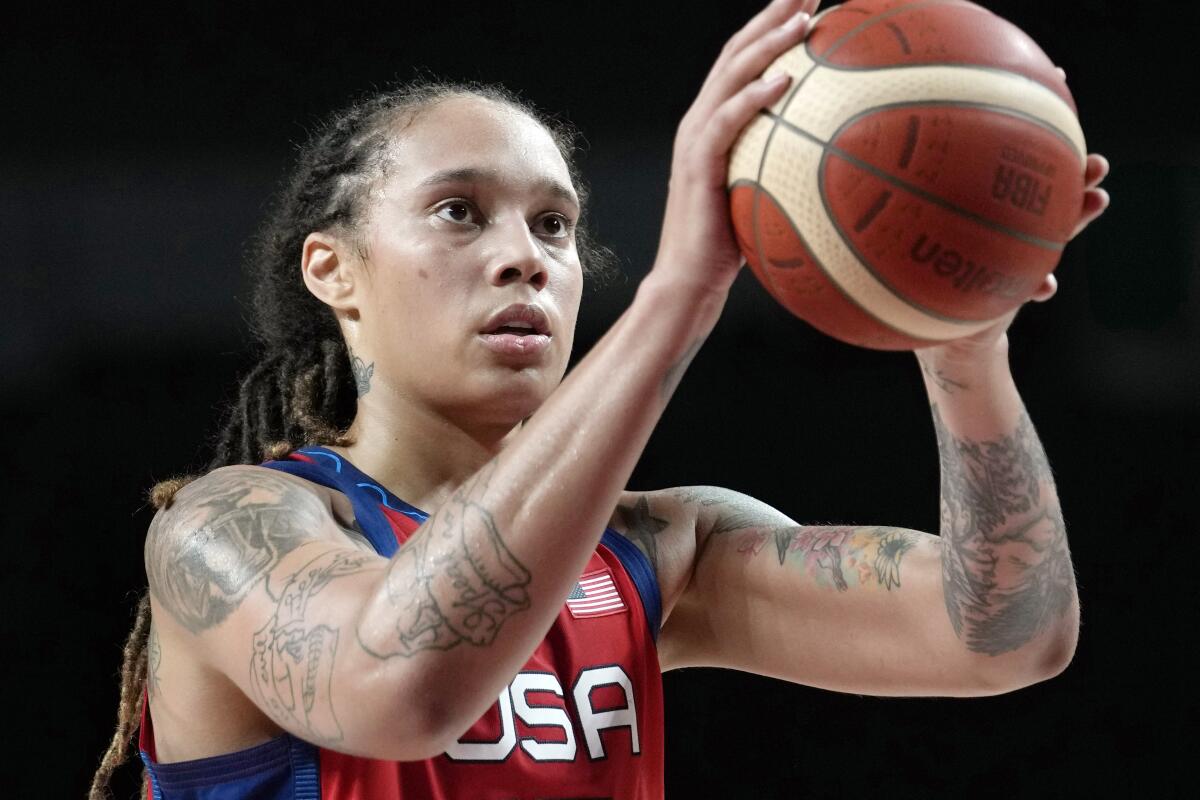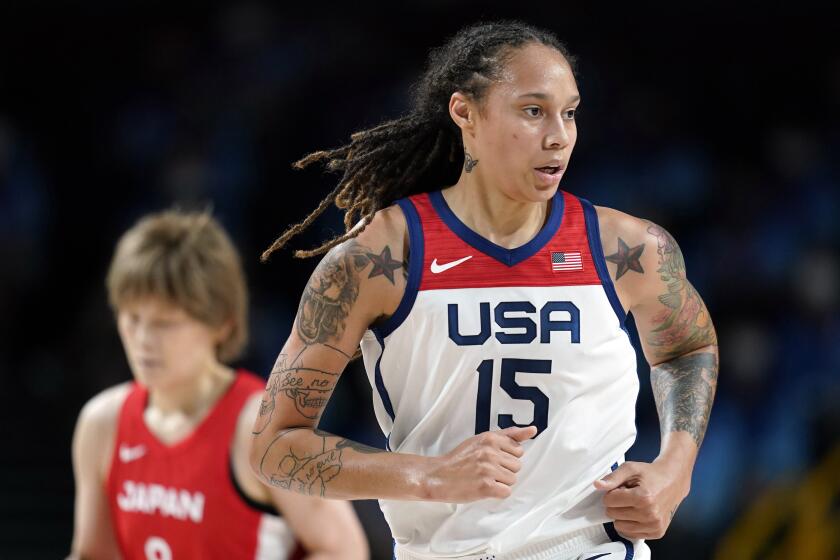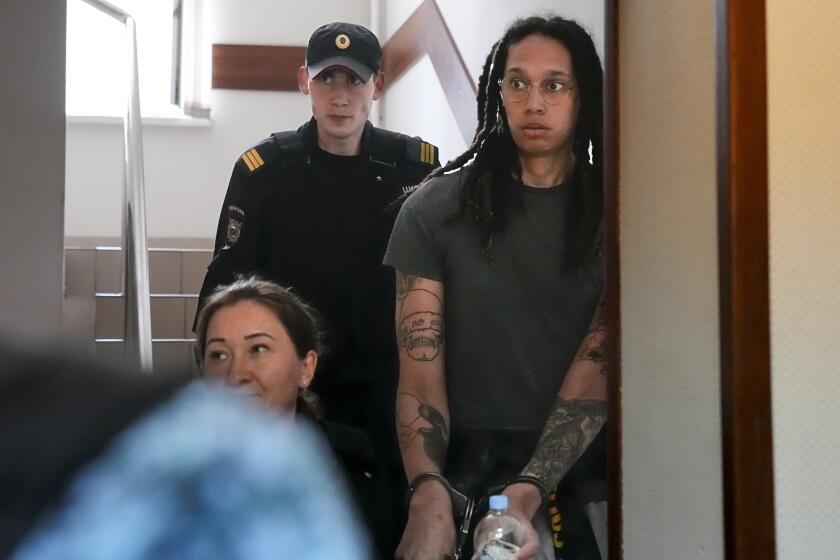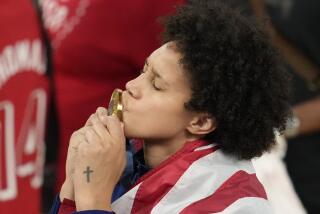Editorial: Free Brittney Griner

- Share via
In a society where men and women athletes were valued equally, female basketball players would not need to travel overseas in the offseason to earn extra money. Professional players, whether men or women, would earn good salaries here at home.
But that’s not the society we live in. Instead, there is such an astounding gender pay gap among professional basketball players that the lowest-paid male players (who make about $1 million a year) earn roughly four times as much as the highest-paid women players (who make about $230,000 annually). Top NBA stars fetch more than $40 million, but even middling players make millions. While the median NBA salary is about $6 million, the median WNBA salary is about $73,000.
The lower pay has led many WNBA athletes to play two seasons — one at home and another abroad, where they can make more than at home. Russian teams reportedly pay WNBA players more than $1 million a year.
WNBA star Brittney Griner was urged to play in Russia to help offset pay inequity. Her agent is pushing to help bring her home and calling for change.
Which brings us to WNBA star Brittney Griner, who arrived in Moscow on Feb. 17, just a week before Russia invaded Ukraine, to play with a Russian team. Authorities at the airport searched her luggage and allegedly found two vaping cartridges with traces of cannabis oil. The Olympic gold medalist has been detained since then on drug smuggling charges, and now faces the possibility of 10 years in a Russian prison.
We don’t know if Griner brought contraband into Russia or if she’s being framed by an adversarial government with an unjust legal system. At this point, it really doesn’t matter. This punishment does not fit the alleged crime, and it’s clear that Griner is essentially a political hostage. She must be freed.
The U.S. State Department has deemed Griner “wrongfully detained,” an official designation that means the government will work for her to be released rather than wait for her case to play out in the Russian legal system. The federal government uses the term when it has information indicating that an American’s arrest overseas was invalid or that they will be treated unfairly in a foreign justice system.
And there is plenty of reason to fear that Griner will not be treated fairly. She is a lesbian in a country with an anti-LGBTQ government. She faces trial in a legal system where prosecutions almost always end in conviction. She is an American in a country the United States is punishing with economic sanctions for its brutal and unprovoked war on Ukraine.
U.S. officials have said they’re working to secure the release of Griner and other wrongfully detained Americans. Paul Whelan, a former Marine, has been held by Russia since 2019 and his family has questioned why he wasn’t freed when the U.S. negotiated the release of another American detainee. Advocates say more than 60 Americans are wrongfully detained or being held hostage around the world. Griner is unusual because, unlike most of them, she is not accused of espionage.
Brittney Griner sent heartbreaking letter to President Biden from a Russian prison pleading for her freedom. Her teammates worry no one is listening.
Negotiating her release, though, is far from simple. Conceding to Russian demands risks the possibility that more Americans could be taken hostage. Not conceding leaves Griner suffering in a Russian prison.
The increasingly public campaign pressuring President Biden to do more to bring Griner home indicates that any quiet negotiations that may be taking place behind the scenes have not been successful. Griner sent Biden a letter on July 4 asking him not to “forget about me and the other American Detainees.” The next day, some 1,200 prominent Black women — including leaders in business, politics, sports and civil rights — signed a letter asking Biden to make a deal to secure Griner’s release. Griner’s wife, Cherelle Griner, took to national television to say she’s shifting gears and “will not be quiet anymore.”
Biden, apparently feeling the heat, took a phone call with Cherelle Griner Wednesday to assure her that he’s working to win Griner’s release. But it shouldn’t have taken more than four months and a string of public pleas for Biden to show the Griner family that he has her back.
It’s understandable that the U.S. government would want to minimize publicity to gain a stronger hand in negotiations with Russia. It’s also understandable that Griner’s loved ones are trying everything possible to bring her home. What’s not understandable is that pay for professional athletes in this nation is so lopsided that it has driven women to seek opportunities in dangerous corners of the world.
More to Read
Updates
9:20 a.m. July 7, 2022: Brittney Griner pleaded guilty Thursday to drug possession during her trial in Russia, saying she inadvertently brought a banned substance into the country because she was packing quickly and did not intend to commit a crime.
A cure for the common opinion
Get thought-provoking perspectives with our weekly newsletter.
You may occasionally receive promotional content from the Los Angeles Times.












